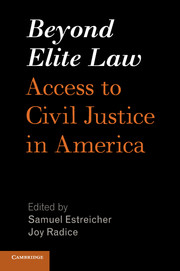Book contents
- Frontmatter
- Contents
- Beyond Elite Law
- Foreword
- List of Contributors
- Overview
- Overview
- PART I CURRENT STATE OF ACCESS TO LEGAL SERVICES
- PART II SOURCES OF LEGAL SERVICES ASSISTANCE FOR WORKING AMERICANS
- 10 Evolution of Legal Services in the United States: From the War on Poverty to Civil Gideon and Beyond
- 11 The Effect of Contingent Fees and Statutory Fee-Shifting
- 12 The Market for Recent Law Graduates
- 13 Clinical Legal Education and Access to Justice: Conflicts, Interests, and Evolution
- 14 Loan Repayment Assistance and Access to Justice
- 15 Federally Funded Civil Legal Services
- 16 New York's Lawyer Referral Services
- 17 Growth of Large Law Firm Pro Bono Programs
- 18 Institutionalizing Pro Bono
- 19 Pro Bono as a Second Career
- 20 Employer-Provided Legal Services for Employment Claims
- 21 Company-Provided Legal Services
- 22 Individualized Justice in Class and Collective Actions
- PART III FASHIONING A REFORM AGENDA
- PART IV CREATING A CULTURE OF SERVICE
- Index
14 - Loan Repayment Assistance and Access to Justice
from PART II - SOURCES OF LEGAL SERVICES ASSISTANCE FOR WORKING AMERICANS
Published online by Cambridge University Press: 05 May 2016
- Frontmatter
- Contents
- Beyond Elite Law
- Foreword
- List of Contributors
- Overview
- Overview
- PART I CURRENT STATE OF ACCESS TO LEGAL SERVICES
- PART II SOURCES OF LEGAL SERVICES ASSISTANCE FOR WORKING AMERICANS
- 10 Evolution of Legal Services in the United States: From the War on Poverty to Civil Gideon and Beyond
- 11 The Effect of Contingent Fees and Statutory Fee-Shifting
- 12 The Market for Recent Law Graduates
- 13 Clinical Legal Education and Access to Justice: Conflicts, Interests, and Evolution
- 14 Loan Repayment Assistance and Access to Justice
- 15 Federally Funded Civil Legal Services
- 16 New York's Lawyer Referral Services
- 17 Growth of Large Law Firm Pro Bono Programs
- 18 Institutionalizing Pro Bono
- 19 Pro Bono as a Second Career
- 20 Employer-Provided Legal Services for Employment Claims
- 21 Company-Provided Legal Services
- 22 Individualized Justice in Class and Collective Actions
- PART III FASHIONING A REFORM AGENDA
- PART IV CREATING A CULTURE OF SERVICE
- Index
Summary
Emily Bremer questions the widely-held notion that loan forgiveness programs are a viable approach to increasing access to affordable lawyers. The chapter presents data showing that reducing law graduates’ debt through these programs does not significantly increase their chances of becoming lawyers for the middle class or the poor.
Loan repayment assistance programs have long been viewed as an effective way for law schools to neutralize the effect of debt on job choice and encourage law school graduates to take relatively low-paying jobs serving the public interest. Whatever the virtues of law school loan repayment assistance programs, however, expanding access to justice does not appear to be chief among them. Although counterintuitive and seemingly at odds with the anecdotal evidence, empirical studies have consistently shown that educational debt is a weak determinant of job choice. Educational debt matters. But not as much as other factors such as wage differentials and career aspirations. The available data suggest that loan repayment assistance programs are generally ineffective in encouraging students to take positions that would not otherwise interest them. Nor does it appear likely that such programs meaningfully increase the aggregate number of public interest or other low-paying but socially beneficial jobs available to law school graduates. Rather, these programs seem primarily to subsidize graduate employment in jobs that would likely exist without the programs. In addition, the programs often support graduates working in government or nonprofit advocacy organizations, which generally do not provide direct legal services to underserved populations.
This chapter urges that law schools should resist pressure to overinvest in loan repayment assistance programs and would be wiser to provide career-contingent scholarships if access to justice is their objective.
LAW SCHOOL LOAN REPAYMENT ASSISTANCE PROGRAMS
The first law schools to create loan repayment assistance programs did so in the late 1970s and early 1980s, in response to concerns that increasingly heavy student debt loads were driving an observed decline in the share of law school graduates taking public interest positions. The cost of legal education was expanding at a seemingly unsustainable rate, resulting in increased educational debt burdens for law school graduates. The number of new lawyers annually entering the profession had also increased steadily in the 1980s – 46,528 lawyers joined the profession in 1989, a 52% increase over the 30,707 who had joined in 1975.
- Type
- Chapter
- Information
- Beyond Elite LawAccess to Civil Justice in America, pp. 218 - 248Publisher: Cambridge University PressPrint publication year: 2016



